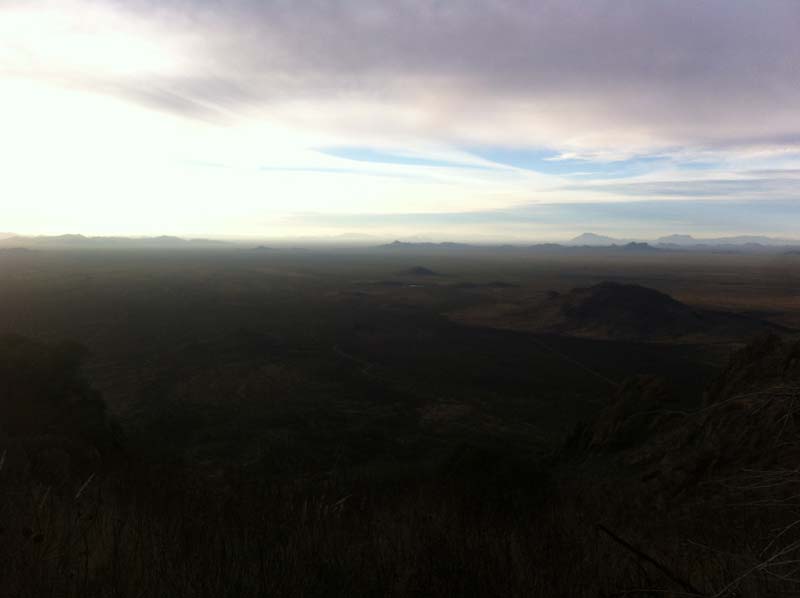go sit
begin
taxonomer mother
what you expend
reformer this gravel
the path leaves out
gallons
the path leaves so
you wack
some offering
through grackles
without care or fact
every cut-up ravines
hanging in bowls you love
the detour chord gape
proliferating flour
itinerant ash then powder
die with marigolds in soundproof garage
theadbare working the rattler
grasslands boil
odd designs burned on
to make this a drink
you see
you see to use its biting elsewhere
are you
where are you
to take back
our vulnerable
asking what
walking in circles
like cihuacotl
like a phobia trying
receding stroking
the feet where
you centrifugue

Hiked up, till near dark, Baboquivari mountain, umbilical cord of the world to the Tohono O’odham, six days after C.D. passed. Crept into a narrow wash to say something for her. This photograph taken of the way down.
The poem is mine like I am its tenant.
That C.D. crossed into everywhere we know how far she is ahead. I don’t miss her but the thanking is so intense I have to live my life. She would all but send you. Autochthonous and spread. Seeing better gave weather.
besmilr was a Mississippi-born writer who lived the last decades of her life and organized all her writing with her husband Roy’s immeasurable aid in rural Arkansas. They lived all over North and Central America 1950-1973, raised Heloise Wilson, out of cars, ships, on the ground, cots, and in little shelters. Storing manuscripts in trunks, binders. By 1980 besmilr was forgotten despite the thunder her work gave that no one else gave.
C.D. did find besmilr. It is problematic to claim someone was found or discovered. We know the blasphemies. Despite it, besmilr did have to be found in the way that some people need to be found, in the way that it can be an inentional pedagogy, a systemic tribute for the need of the times of one woman or many. besmilr disappeared with five decades of work. She and Roy were old and poor and content. She said enough of sending out, let’s just see what the earth can do with me. That is my sense. And, in one more sense, she had to be found. They had no phone. They didn’t move much. They were frail. She was stepping into Alzheimers. C.D. had to find them by listening to whispers around Arkansas. She had to find them by initiating and completing the Lost Roads project, by reading the out-of-print, by sniffing the old earth, phoning the Horatio postman, and showing up with peaches. It is my sense that only C.D. could have found her, found her manuscripts in the cabinet in the converted chicken coop, found the significance, the journey, the resistance, the roots, and empathies and attempt.
Only C.D. could’ve. I know that. I think many do, but we should talk about it more. There’s something there. Having worked in the archive, befriended Heloise and the grandchildren, and the great-grandchildren, others 1. would have never found her (too hard, too vernacular, too poor, too real, too hot) and if they had 2. probably would’ve seen a poor old witch who happened to write. But C.D. knew witches and knew poets that feel like witches are especially good, especially vocal, especially cognizant. They ricochet the living. They run through rock. They speak the rock. They give the run.
I was a student of C.D.’s. She didn’t teach. She sent. She was a very difficult teacher to me. The classroom was anticlimactic. Advice minimal and blunt. Sometimes rude. Flashing out all premature transgressions. When I brought curry turnips to a potluck, she said, “My dad always said only poor people eat turnips,” and when I brought farming poems to workshop, “This is like new world order stuff,” or hitch-hiking poems, “Who can hitch-hike these days?” Flipping through my thesis manuscript, over cups of wine, in the heat of semester’s end, she disbelieviningly muttered, “This is nice, nice, nice...” before targeting the shaky range of its extreme minimalism, its hiding, its indecisions (the conversation stays with me, I am still going, I am still having it). But when I read Run Through Rock and wrote to her about my experience, in Fred Moten’s sense of the phrase, I got sent.
C.D. taught by sending people to the world, and that means different things. But for me the world was the archive and Heloise’s stories; a different view of the Americas and death. Confronting besmilr both affirmed and challenged my faith in marginal resistance, in nomadism and self-identification. The world C.D. sent me to was Heloise pointing at old shacks her parents squatted in, and the irrigation ditch that appears in poems about migrant workers walking up out of them from the other side of the border; reading the long poem “Blue Toro”, finding the notebooks, finding the last poems, handwritten, and crying. The world C.D. sent me to was going through the whole archive with Heloise in the hospital, cataloguing it, sleeping in a bed with my wife in the middle of it, and waking up to them, the presiding dead, with their feet dangling over the boxes. Learning to listen to a dead poet, paying my dues. It is the most resilient pedagogy. C.D. is the teacher in such a confounded out-the-side-of-her-mouth mystical sense who threw the stones of my life out over beyond, way beyond my head. And this part of her, these stones, is alive. She is alive beating in my chest and anchoring the bones in my feet.
Tucson, AZ 1/18/16 - 2/10/16